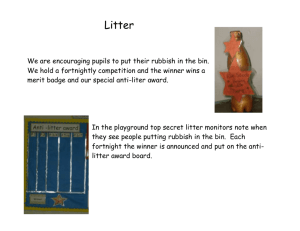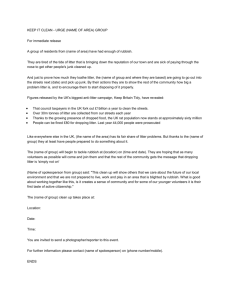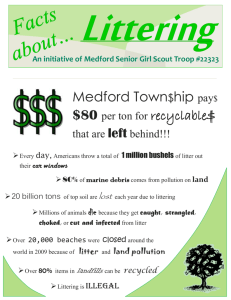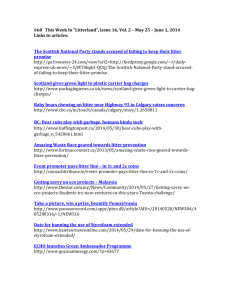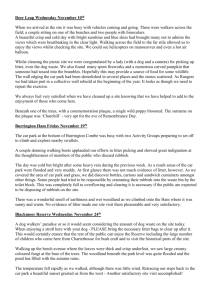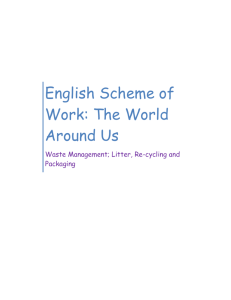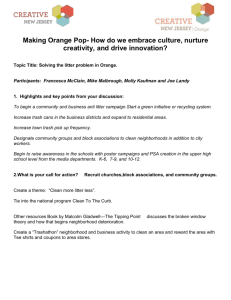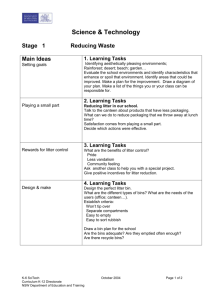Human body
advertisement
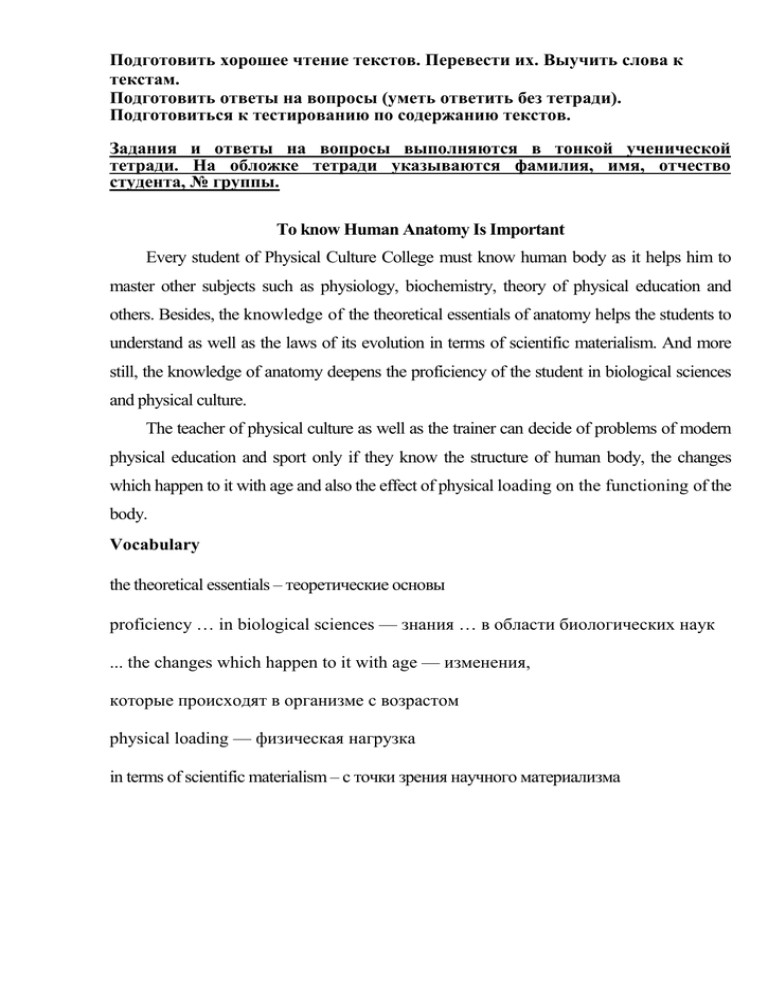
Подготовить хорошее чтение текстов. Перевести их. Выучить слова к текстам. Подготовить ответы на вопросы (уметь ответить без тетради). Подготовиться к тестированию по содержанию текстов. Задания и ответы на вопросы выполняются в тонкой ученической тетради. На обложке тетради указываются фамилия, имя, отчество студента, № группы. To know Human Anatomy Is Important Every student of Physical Culture College must know human body as it helps him to master other subjects such as physiology, biochemistry, theory of physical education and others. Besides, the knowledge of the theoretical essentials of anatomy helps the students to understand as well as the laws of its evolution in terms of scientific materialism. And more still, the knowledge of anatomy deepens the proficiency of the student in biological sciences and physical culture. The teacher of physical culture as well as the trainer can decide of problems of modern physical education and sport only if they know the structure of human body, the changes which happen to it with age and also the effect of physical loading on the functioning of the body. Vocabulary the theoretical essentials – теоретические основы proficiency … in biological sciences — знания … в области биологических наук ... the changes which happen to it with age — изменения, которые происходят в организме с возрастом physical loading — физическая нагрузка in terms of scientific materialism – с точки зрения научного материализма The man The human body consists of the following main parts: a head, a torso and limbs. Our head is the centre of all bodily activity. The forehead, the eyes, the eyebrows and the .eyelashes, the nose, the mouth, the cheeks and the chin make the face. The mouth consists of two lips, teeth and a tongue. The eyes and the ears are very important organs. We 'see with our eyes and we hear with our ears. The main parts of the torso are the chest, the shoulders, the blades, the back, the waist and the hips. The leg consists of a thigh, a calf, a 'knee, a shin, an ankle and a foot. The foot in its turn consists of a heel, a sole, an instep, a ball and toes. The arm consists of an upper-arm, an elbow, a forearm and a hand. The wrist is the joint which unites the arm with the hand. The 'hand consists of a palm a back of the hand, four fingers fore finger, middle finger, ring finger, little finger and a thumb. The surest way to keep fit is to go in for sport all our life. So let's make it our motto. Words and Word Combinations consist of — knее — колено состоять из shin - голень. surest way to keep ankle - лодыжка fit — верный путь heel - пятка быть здоровым и sole — подошва бодрым instep - подъем human — toe палец на ноге ball человеческий - подушечка пальца arvel — чудо eyelash — ресничка torso — туловище mouth - рот limb - конечность tooth — зуб, forehead — лоб. tongue — язык, eye — глаз lip — губа, eyebrow — бровь cheek — щека, waist — талия chin — подбородок thigh — бедро face — лицо calf— икра (ноги) ear — ухо chest — грудная клетка, shoulder — плечо blade — лопатка back - спинa arm-pits подмышки elbow - локоть forearm — предплечье, hand — рука, (кисть) wrist запястье joint - сустав palm – ладонь finger - палец руки thumb большой палец руки, motto - девиз Questions 1. What main parts does the body consist of? 2. What the main parts of the torso? 3. What does the leg consist of? 4. What makes the face? 5. Name the parts of the, the foot, the arm, the hand. 6. What is the surest way keep fit? DIALOGUE A: At the next lesson we must name all the parts of the. Let repeat them. B: Oh, it is very useful to repeat them now. So what are the main parts of the human body? A: The main parts of the human body are: the head, the torso and the climbs. Now tell me about the organs of breathing. B: The organs of breathing are: the nose, the mouth, the throat and the lungs. These organs are very important for the life of a man. I've forgotten the English for the English organ which joins the head to the torso. A.: Oh, it's the neck. Tell me, what does the arm consist of? В.: The arm consists of the upper arm, the elbow and the forearm. The part from the shoulder to the elbow is the upper arm from the elbow to the wrist is the forearm. And what does the leg consist of? A.: The leg consists of the thigh, the knee, the shin and the foot. В.: We have mentioned almost everything, haven’ t we? A.: I suppose we have. В.: Let us 'call it а day then. (Давайте на этом закончим) A.: Yes, let us. Human body Human body is a marvel of construction. Every part of the human body has its own duty which it performs without difficulty as long as the man takes care of his health. If we are not careful enough we may sprain an ankle, twist a blade, pull a muscle, strain the eyes, break a leg or an arm, etc. It is important for sportsmen learning the English language to know well the names of all parts of the human body in English as all special sporting texts contain a great number of words concerning numerous parts of the body. Especially it concerns such kinds of sport as swimming, track-and-field athletics, gymnastics, boxing, sports games and others. The knowledge of such words helps the student to better understand sports texts and makes communication between sportsmen easier. Students engaged in different kinds of sport have to read much English literature. Learning English words helps the student to acquire the necessary proficiency. Questions 1. What harm can we do to our body if we are not careful enough? 2. Is it important for sportsmen learning the English language to know well the names of all parts of the human body in English? 3. Do the special sporting texts contain a great number of words concerning numerous parts of the boy? 4. What kinds of sport does it especially concern? HEALTHY FOOD All food is made up of nutrients which our bodies use. There are different kinds of nutrients: carbohydrates, proteins, fats, vitamins and minerals. Different foods contain different nutrients. Before we cut down on fat, sugar and salt, we have to know a bit more about the kind of food these things might be in. The biggest problem comes when these things are hidden in other foods: biscuits, crisps, sausages, meat pies, soft drinks and so on. The best way is to get into the habit of checking the ingredients and nutritional value on the sides of packets although this isn't always easy to do. Another thing to know is, for example, that we do need fat to live, it's an essential part of our diet and physically we couldn't exist without it. But we all know that to eat much fat is bad for our health. The matter is that there are different kinds of fat. There are fats that are good for us and fats that are bad for us. Eating less of the bad ones and more of the good ones can actually help us to live longer! Bad fats are the saturated fats, found in animal productions, like red meat, butter and cheese. Friendly fats are the unprocessed fats found naturally in foods like nuts and seeds, olives, avocados and oily fish, including tuna. One more thing to know is that when food is cooked, its structure changes. It can change the vitamin and nutrient contents of food. More and more people feel strongly about the way, their food is produced. Nowadays so much of the basic food we eat — meat, fish, fruit and vegetables — is grown using chemicals and additives. Although fertilizers and pesticides have greatly increased the quantity of food and helped to improve its appearance, there is a growing concern about the effects of these chemicals in the food chain. This concern has led to a growth in the demand for organically grown products. Today there is another problem. It is modified food, which is cheaper that ordinary one. There is a rumour that such food can cause cancer and other problems. Nobody knows, either is just an imagined fear or a real problem. This problem could be solved and examined, but it will take some time. The food we eat depends on lots of things. Taste is a big factor. Culture, religion and health also play a part in what food we eat. Advertising and social factors also have a big influence. Income is also an important factor. That is why not surprisingly, money, rather than a lack of knowledge about how to eat well, is at the heart of the problem. Finally, there are three main messages to follow for healthy eating: First, we should eat less fat, particularly saturated: Secondly, we are to cut down on sugar and salt. Thirdly, we must eat more fresh fruit and vegetables. QUESTIONS: 1. What nutrients do you know? 2. What are the main things to know about food we eat? 3. What fats are good? 4. What fats are dangerous for our health? 5. What are the main factors that determine the food we eat? 6. What are three main messages to follow for healthy eating? VOCABULARY: nutrient — питательное вещество carbohydrate — углевод protein — белок fat — жир to contain — содержать to cut down on — уменьшить прием чего-л. to hide (past hid, p.p. hidden) — прятать, спрятать crisp — ломкий, хрупкий to get into the habit of — зд. взять за привычку essential — существенный, жизненно важный saturated fat — жиры с высоким содержанием насыщенных жирных кислот butter — масло unprocessed fat — необработанные жиры seed — семя, семечко avocado — авокадо, аллигаторова груша tuna — тунец additive — добавка fertilizer — удобрение pesticide — пестицид, ядохимикат to increase — увеличить to improve — улучшить concern — интерес, участие, заинтересованное отношение food chain — пищевая цепочка to lead (past led, p.p. led) — вести, приводить demand — потребность modified food — модифицированная еда rumour — молва, слух(и), слушок, толки to cause — быть причиной, вызывать cancer — рак (онкология) fear — страх, боязнь, опасение to solve — решать to depend on — зависеть от income — прибыль; заработок lack — недостаток, нужда; отсутствие чего-л. Environment Why throw away so much? Many countries bury and forget about millions of tons of rubbish every year. It is known that in one year, a European family with two children throws away about 50 kilos of paper (that’s six trees), and about 60 kilos of plastic. The Green World reports say "that in one year the average person throws away: about 70 food cans, 34 cans of pet food and about 70 drink cans. But we don't have to throw away all our waste paper, glass, metal and plastic. We can also burn or recycle a lot of it. In fact waste can be wonderful stuff. Many things that we throw away can still be useful. In fact it's possible to recycle 80% of domestic rubbish. We can recycle most kinds of paper, glass, metal and plastic. But only 4% recyclable material is actually recycled. Recycling is expensive. But it saves trees and energy and protects the environment from pollution. Packaging These days, people usually do shopping in supermarkets. Nearly everything is packed in paper or plastic containers. Some of this “packaging" is necessary. It keeps food clean and fresh. But some packaging is not necessary. It's just to make the food look better. Every year in Britain each person produces about 57 kilograms of plastic waste. Disposing of all this plastic is an expensive problem. But that's not all. Making plastic causes pollution. Unfortunately, some of this packaging doesn't reach the bins. It becomes litter instead. Some people simply tear the wrapping off sweets and throw it away. They drop their cigarette packets and cans of drink without a thought. In the town their litter looks horrible. But fortunately someone clears it away. In the country side, it remains in the fields and on the roadsides unless the people who live nearby pick it up. It can kill or hurt farm animals. Bottles and cans cause cuts, and the animals can eat polythene bags and die, or put their heads in them and suffocate. Vocabulary: Prohibit (запрещать) – be (strictly) prohibited, prohibition Recycle (перерабатывать) – recyclable, recycled paper, recycling, a recycling centre Litter (мусор) – drop litter, clear litter (away), rubbish, garbage Pack (упаковывать, упаковка) – packed / unpacked goods, packaging (упаковка) To throw at, to = get rid of Can (мочь, коробка, банка) Damage (разрушать) Questions: Why have many species of birds and animals disappeared? What is the air polluted by? Are rivers polluted? Why are forests disappearing all over the world? Can you see pollution at the seaside? What are the most serious environmental problems now? Do you have bins for different rubbish in your street? What does your family do with the rubbish? Who takes the rubbish out? Do you try to throw away less rubbish? Do you know about recycling? What have you heard about it? What products are recycled in Russia? Use: collect, throw away, bury, recycle, produce, protect the environment, be polluted with chemical waste, be in danger, waste pap cans, bottles, metal, plastic. Find words or word combinations in the texts: a) which have a similar meaning to the following: litter; to get rid of; to make; the packaging; to save; to damage; terrible; b) which have a opposite meaning to the following: to look worse; impossible; cheap; to destroy; dirty; to remember; fortunately. Questions: What can people do with rubbish instead of just throwing it away? Why is recycling important nowadays? How much of recyclable material is actually recycled? Why so little? Are there recycling centres in your town / village? What do people usually take there? Is packaging necessary? Why? Why does some packaging become litter? Why is litter so dangerous in the countryside? Is litter a big problem in your town / village? Why don't you and your friends organize a "clean-up day" to clear all the litter in the local park / outside the college? Its a wonderful world we live in. For thousands of years the Earth has given support to all forms of life — human beings, animals, birds, fishes, insects and plants. But now human beings are killing our planet. Many species of animals and birds have disappeared. Millions of animals die every year because man has polluted their natural homes. Be-sides, every year people cut down more trees, build more roads, and use more land for farming. This leaves fewer jungles, fields and forests for wildlife. The country air, once clean and fresh, now may be polluted by power stations* and factories. Some of our rivers are now empty offish. And in some rivers you can even see a thick foam caused by chemical waste All over the world the forests are disappearing. People cut the trees down because they need wood and paper or new places for farms and houses. Forests the size of Belgium are destroyed every year. It's an international disaster. Even if new trees are planted, it takes many years for them to grow. Go to the seaside and you'll see the pollution around you. There is a lot of litter on the beaches. Some of it was left by, people and some was brought by the water. Pollution is very dangerous for people, wildlife and the environment. We live among litter and wastes which we have created ourselves — fumes of cars, throwaway packaging**, etc. People, don't just pollute the environment. They pollute themselves with cigarettes, alcohol and junk food***. These are some of the world's most serious environmental problems. And it's no good pretending they don't exist — they do. What's more, they are getting worse all the time! What will happen if we don't try to solve these problems? Scientists have made predictions and they are alarming. * power stations — large buildings in which electricity is made ** throwaway packaging — material which is used for packing products and should be thrown away after use *** junk food — unhealthy food like popcorn, chips, hamburgers etc.

